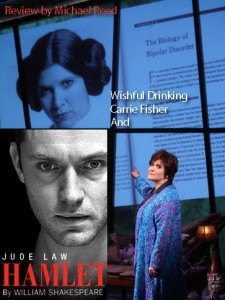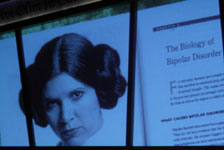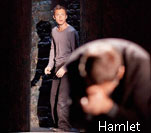“A Steady Rain”: Hugh Jackman & Daniel Craig, Tuesday, September 15 – The Gerald Schoenfeld Theatre
As someone who attends a great deal of Broadway theater, I am a little nonplussed about the “star effect” that many producers have increasingly introduced to that wondrous island of American theater between 55th and 41st Streets (my apologies to Lincoln Center’s Vivian Beaumont a few blocks north). Oftentimes when Rodeo Drive meets Broadway, the results can be disastrous (I love you, Julia Roberts, but your turn in the Broadway play, “Three Days of Rain” . . . Ouch!!). This past season on Broadway featured a generous helping of Hollywood star power, including Jane Fonda, Will Ferrell, James Gandolfini <http://www.imdb.com/name/nm0001254/>, Jeremy Piven, Jeff Daniels, Marcia Gay Harden, and Hope Davis. Please indulge this writer in saying bless you, Will Ferrell, for that deeply cathartic and hilarious send-off of our 43rd President—”You’re Welcome America: A Final Night with George W. Bush.” Mr. Ferrell broke all box office records for the Cort Theatre and had audiences whipped into a frenzy worthy of a Texas vs. Oklahoma football clash.
This past season’s group of West Coast stars moved east acquitted themselves very well, achieving critical acclaim and for the most part box office success. However, last season was the exception to the rule. Even our most accomplished film stars often would do better to keep their performances confined to the big screen. With this reality in mind, I was a bit skeptical while walking to the theater to see two of Hollywood’s sexiest, squeal-inducing leading men in a piece of theater featuring only them, two chairs, and a grim tale of human descent into hell. Hugh Jackman and Daniel Craig, otherwise known as Wolverine and James Bond, seemed unlikely candidates to carry an evening of monologue-heavy serious theater. I am very happy to report that for the most part I was wrong.
“A Steady Rain” is the story of a couple of rough-hewn Chicago cops who have  been lifelong friends and couldn’t be more different from one another. Denny (Mr. Jackman)
been lifelong friends and couldn’t be more different from one another. Denny (Mr. Jackman) is a family man with a wife and kids and is clearly the alpha in the friendship. Denny is big, strong, supremely confident and loyal and possesses a skewed moral compass and explosive temper that eventually leads the two friends down a tragic path. Mr. Craig plays Joey, a somewhat withdrawn, self-conscious bachelor who has had some real problems with the bottle and never seems to meet the right women. Joey is also fiercely loyal to his alpha friend and puts up with consistent abuse from Denny because he loves him like a brother. As the curtain opens on “A Steady Rain,” we find our ultra sexy action heroes—er, I mean two Chicago cops—sitting on simple wooden chairs in understated lighting, facing us dead on. The two are dressed unremarkably: Mr. Jackman in the more casual jeans and blue plaid shirt and jacket, sleeves rolled up with tats, a look belying Joey’s natural confidence and arrogance; and Mr. Craig’s Joey wearing a well worn Woolworths-looking suit, that of a man who takes comfort in routine and anonymity.
is a family man with a wife and kids and is clearly the alpha in the friendship. Denny is big, strong, supremely confident and loyal and possesses a skewed moral compass and explosive temper that eventually leads the two friends down a tragic path. Mr. Craig plays Joey, a somewhat withdrawn, self-conscious bachelor who has had some real problems with the bottle and never seems to meet the right women. Joey is also fiercely loyal to his alpha friend and puts up with consistent abuse from Denny because he loves him like a brother. As the curtain opens on “A Steady Rain,” we find our ultra sexy action heroes—er, I mean two Chicago cops—sitting on simple wooden chairs in understated lighting, facing us dead on. The two are dressed unremarkably: Mr. Jackman in the more casual jeans and blue plaid shirt and jacket, sleeves rolled up with tats, a look belying Joey’s natural confidence and arrogance; and Mr. Craig’s Joey wearing a well worn Woolworths-looking suit, that of a man who takes comfort in routine and anonymity.
The play starts slowly as Mr. Jackman starts off recounting the story of Denny and Joey’s longtime friendship. Initially, it is hard to get past the Australian Mr. Jackman’s struggle to  maintain a working class Chicago accent. Mr. Craig, conversely having a serious London stage acting resume (“Angels in America,” “A Number”) hits his stride early and really transforms into Joey, accent and all (absolutely no resemblance to 007). We are taken through a tale of two not too overly intelligent beat cops, who never seem to make the grade in the move up to detective. Through dialogue and monologue we begin to understand how the characters’ lives are inextricably intertwined. Could they pull away from each other if their lives depended on it? Slowly the play starts to gain momentum and diverts the audience’s attention from the two actors’ Adonis-like physiques and toward a story that very plausibly makes us understand how two profoundly loyal friends could turn against one another with the most devastating of results.
maintain a working class Chicago accent. Mr. Craig, conversely having a serious London stage acting resume (“Angels in America,” “A Number”) hits his stride early and really transforms into Joey, accent and all (absolutely no resemblance to 007). We are taken through a tale of two not too overly intelligent beat cops, who never seem to make the grade in the move up to detective. Through dialogue and monologue we begin to understand how the characters’ lives are inextricably intertwined. Could they pull away from each other if their lives depended on it? Slowly the play starts to gain momentum and diverts the audience’s attention from the two actors’ Adonis-like physiques and toward a story that very plausibly makes us understand how two profoundly loyal friends could turn against one another with the most devastating of results.
It should be noted that much of the credit for the success of “A Steady Rain,” beyond the considerable talents of its actors, should go to the subtle and self-effacing direction of John Crowley, who stunned Broadway with the brutal and brilliant “Pillowman” several seasons ago. Mr. Crowley took the two actors through a very demanding rehearsal period but directed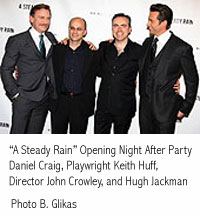 to the talents of his actors and did not impose a forced director’s will. For his part Mr. Craig gives a fine performance and is eerily subtle in how he transforms Joey from a loyal friend to a betraying enemy. In the story’s moments of acute tragedy, Mr. Jackman makes his mark. In these moments when Denny is completely bewildered and overwhelmed by what has become of his life, what Mr. Jackman might lack in stage acting technique, he more than makes up for with his physical presence and intense
to the talents of his actors and did not impose a forced director’s will. For his part Mr. Craig gives a fine performance and is eerily subtle in how he transforms Joey from a loyal friend to a betraying enemy. In the story’s moments of acute tragedy, Mr. Jackman makes his mark. In these moments when Denny is completely bewildered and overwhelmed by what has become of his life, what Mr. Jackman might lack in stage acting technique, he more than makes up for with his physical presence and intense 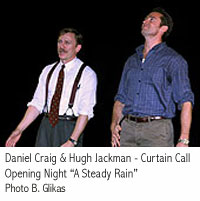 passion. We truly feel the tragedy that has become these two men’s existence. And after all, isn’t that what we want to feel when we go to the theater? Mission accomplished 007 and Wolverine! You reached this theater snob. Thank you, Mr. Jackman and Mr. Craig.
passion. We truly feel the tragedy that has become these two men’s existence. And after all, isn’t that what we want to feel when we go to the theater? Mission accomplished 007 and Wolverine! You reached this theater snob. Thank you, Mr. Jackman and Mr. Craig.
Reviewed by Michael Reed
